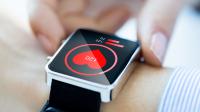Digital health: A growing market
Wearables. Virtual nurses. Home diagnosis through AI. Robotic surgery. Telemedicine. Bioprinting organs. Digital health is a growing market that creates major opportunities to improve the health of millions of patients worldwide as well as new business opportunities. However, there are several legal challenges associated with digital health. In this article we will focus on certain central challenges.

What is digital health?
Digital health can broadly be described as the many information and communication technologies within public and private healthcare used for disease prevention, diagnostics, rehabilitation, and treatment. Digital health solutions come in all shapes and sizes and cover everything from relatively simple training apps to complicated technologies such as robotic surgery and organ bioprinting.
Use of digital health solutions in the Danish public sector
The possibilities of digital health are many; commercially and publicly. If we look at the public perspective, Denmark already has one of the most digital public health sectors in the world. Denmark is leading in terms of advanced IT systems at hospitals and GP clinics and digital communication between the different players in the health sector. The public health sector offers solutions such as the Shared Medication Record ("Medicinkortet") and the Danish Health Portal ("Sundhed.dk") and even more within the different regions. In 2018, the Ministry of Health launched its digital health strategy 2018-2022 to further ensure "A Coherent and Trustworthy Health Network for All".
During the COVID-19 pandemic, the use of digital health solutions has rapidly increased. Among other things, the GP clinics have been offering their services virtually, and general considerations on efficiency, resource optimization etc., indicate that digital health may take over many of the traditional medical functions within the public health sector and will be used even more post the COVID-19 pandemic.
Private digital health solutions
In the private sector, simple digital health solutions such as apps and wearables to monitor training and health are becoming increasingly popular. Private providers have also developed apps offering more advanced medical services, such as apps for diabetics to collect data regarding blood sugar and diet, data sharing with healthcare professionals via cloud services, medical examinations at home through a digital stethoscope or a contactless thermometer, and app communication with a "Doctor on Demand".
Interesting perspective also outside Denmark - the UK National Health Service (NHS) uses the privately developed app "Babylon", a virtual nurse providing diagnoses 24-7 via AI and text-based dialogue with the users. On their website, Babylon promises that their technology "has been designed around a doctor's brain to provide accessible healthcare for millions in the palm of their hands".
Legal perspectives
Use of digital health solutions is not subject to unified regulation or even an official legal definition in the EU or in Denmark. However, the digital health solutions may fall within the scope of several EU and Danish regulations, so there are some legal "attention points" to be aware of when developing, manufacturing, and/or offering digital health solutions. From a Danish law perspective, the main rules and regulations to be aware of are the following:
- Legislation on processing of personal data ("GDPR")
- EU and Danish rules concerning medical devices
- The Danish Health Act
Digital health solutions often contain sensitive personal data, and suppliers or other data processors related to the products must comply with GDPR. This means that the data processor - besides the regular GDPR compliance - needs to consider further requirements, e.g. data minimization and extended transparency. The supplier additionally needs to be extra aware of data security and consent requirements in cases where consent is used as the basis for processing the personal data.
Digital health apps may fall under the scope of the medical device rules if they have a medical purpose. If an app falls within the scope of the medical device rules, it must comply with the strict conditions applicable to medical devices before it can be marketed.
The Danish Health Act may also be relevant in some cases of cross-border telemedicine services, as Danish residents under given circumstances have the right to reimbursement of the costs of healthcare provided in other EU/EEA Member States.
Commercial perspectives and contracts
When drafting and negotiating contracts on digital health solutions, some fundamental issues should be considered:
- Compliance with relevant rules and regulations (see above)
- Product liability and liability in general, especially in case of medical errors and misdiagnoses
- Ownership and processing of personal data
- Cyber security considerations
- Sustainability, including environmental initiatives and data ethics, e.g. green data centres
We will address this, and the other topics mentioned above, further in our coming posts. Please reach out to us, if you have questions or comments.
Contact

